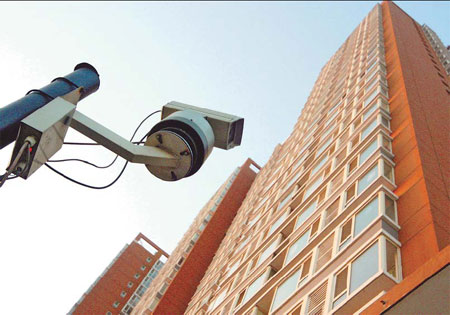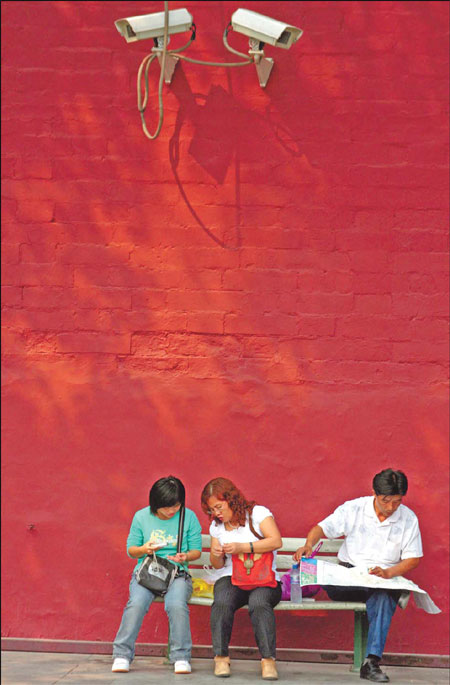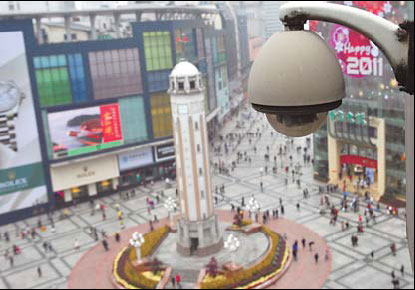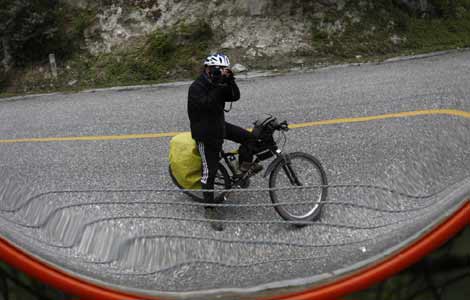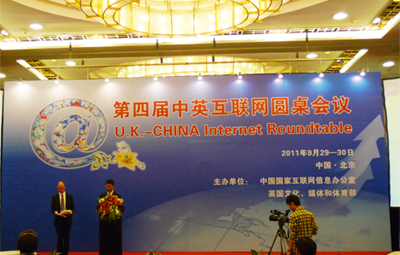Public eye: when cameras turn on you
Updated: 2011-10-06 07:59
By Duan Yan and Wang Yan (China Daily)
|
|||||||||
|
|
At nearly 3 pm on July 29, Deng was driving his silver Nissan SUV at 92 kilometers per hour on an expressway in Santai county, Sichuan province. Recording his violation of the speed limit, which was set at 80 km/h, was a police camera.
It was not the first time Deng had sped. This time, though, his punishment wasn't simply the 200-yuan fine ($30) he had to pay in the past.
This time, the police camera had caught him using his right hand to fondle the breasts of a woman sitting in the passenger seat of his car while he steered with his left hand. A month later, the high-definition picture had been widely disseminated online, and Internet users had learned his name, the name of his former employer and his home address.
Even though they gave Deng the nickname "Breast Touching Brother", those who were discussing the case were more interested what it meant for privacy rights than in making fun of him.
"I don't think people should laugh at Deng for his act," said Luo Cuimin, 28, a staff member at an advertising company in Beijing.
"Instead, we should start worrying about who will be the next victim of these privacy violations. It could be anyone."
After the incident, 1diaocha.com, an online survey website, surveyed Internet users' attitudes toward surveillance cameras. Of the 351 people who responded, 49 percent said they thought the cameras were intrusive.
"Public security is very important, and I want my family and friends to be safe, " Luo said. "Besides that, I sincerely hope that when people want to kiss and embrace the people they love in public, they don't have to worry about whether a surveillance camera will put their every movement online."
According to XiaoYong, spokesman of the Mianyang Traffic Police Detachment, the pictures of Deng and his passenger could be seen by traffic officers anywhere if they looked up information about past traffic violations on the local police's internal computer network.
Professor Zhou Hanhua, a researcher from the Chinese Academy of Social Sciences' institute of law and an expert on the protection of private information, said he suspected that the police have been unable to discover who is responsible for leaking the photo.
"If they really wanted to investigate, it wouldn't be difficult to do with current technology."
|
|
Zhou said it is difficult for Deng and other private citizens to protect themselves using the current legal system.
"There is no law for dealing with such cases," Zhou said. "If someone wants to sue someone else for maligning his or her reputation in a case like this, collecting evidence will be difficult or even impossible. And it will be extra difficult when it comes to suing the government."
"It's reasonable that Deng would give up on pursuing litigation," Zhou said, "but it makes our country's legal system look ridiculous."
Deng is far from the only victim of the misuse of surveillance cameras. In 2008, three staff members at the Shanghai Metro Company recorded a couple kissing in the Shanghai Youyi Road subway station. They edited the footage down into a three-minute video that they enlivened with their own comments and then posted the final product online.
After the video was widely circulated, the victims, Wang Fei and his girlfriend Xia Yinghui, received a slew of phone calls and text messages from friends, colleagues and strangers. Embarrassed by the video, Wang quit his job. Shanghai Metro later apologized to the couple.
The same year, Southern Metropolis Daily reported that a surveillance camera in Shenzhen was being pointed about midnight to peer into the bedroom and bathroom windows of a nearby apartment building. The videos it captured were then posted to the Shenzhen Traffic Police Bureau's website.
The Shenzhen Police investigated the case and arrested two temporary staff members who had been hired by the local traffic police. Three months later, the traffic police modified the surveillance system in a way meant to prevent it from being abused in the future.
Slow progress
China now has no regulation governing surveillance cameras, and local governments haven't gone much further. The Shanghai government has promulgated regulations meant to govern how technology can be used but they do not deal with the issue of privacy protection. Shenzhen, for its part, has no similar regulation.
As early as 2003, Zhou began leading a team of experts in the drafting of a law meant to protect private data. The upshot of their work was eventually to be submitted to the State Council's informatization office.
The team submitted an "experts suggestion" draft in 2005 but that has yet to be scheduled to go before legislators. In the meantime, the informatization office was eliminated during a reorganization of China's central government and its functions were merged with those of the Ministry of Industry and Information Technology.
Zhou said China is behind other places in its privacy regulations. "There are already more than 70 countries that have put forth laws dealing with the protection of personal information," Zhou said. "I hope our country can catch up on that trend soon."
The booming industry
While progress in protecting privacy is slow, the surveillance industry is expanding rapidly.
In the past five years, China's fast economic development and large events such as the 2008 Beijing Olympics and the 2010 Shanghai Expo have helped the security and protection industry in the country to enjoy a boom.
Government campaigns have also been helpful.
|
|
In 2002, the Ministry of Public Security started what it called a "safe city" project, concentrating first on Beijing and the capital cities of Shandong and Zhejiang provinces as well as Suzhou in Jiangsu province. Within two years, 21 more cities had joined those four and, by 2008, 180 more.
According to Beijing Daily, the number of surveillance cameras in Chinese cities continues to increase. The newspaper reported on April 22 that the city contains more than 400,000 video cameras that are pointed at public places. The Shenzhen municipal government and Shanghai have meanwhile installed more than 200,000 in their cities.
The Chongqing city government announced on August 9 that it will invest 20 billion yuan to install a system that will be used to prevent and control emergencies. It is to include 500,000 video surveillance cameras and is to be place by the end of 2012.
The government boasts that once the system is completed it will not only be the largest such system in the country, but also the largest the world has seen since a similar system was established in the United States following the Sept 11, 2001, terrorist attacks.
According to statistics from the China Security and Protection Industry Association, the sale of video-surveillance equipment in China has become a business worth 126.5 billion yuan. The industry has seen the value of its sales increase at an average rate of 25 percent since 2005, and it is now composed of 25,000 companies employing 1.2 million people.
Reliance on devices
"Public security and social stability are of great importance to China," said Li Ping, secretary of the Beijing Security and Protection Industry Association. "These big international events and the safe city project have contributed greatly to the expansion of the industry. "
In addition to providing security, the cameras seem to have become important as "witnesses".
In Nanjing in 2006, a man learned what can happen when no one is around to see what he considered to be an act of kindness.
Peng Yu, a resident of that city, says he helped an old woman up after she had fallen near a bus stop. Rather than thank him, she turned around and accused him of pushing her down. Since no one witnessed the event, a local court ruled in her favor and Peng was ordered to pay her 40,000 yuan ($6,255) in compensation.
The dispute has led many in the public to feel reluctant to offer a helping hand to old people who have fallen.
The presence of a surveillance camera can lead to a different outcome.
In August, for instance, a bus driver in Nantong, a city in Jiangsu province, saw an old woman lying on a road after she had fallen off a tricycle and went to help her. Like Peng in Nanjing, he too was accused of causing the accident. Fortunately for him, though, a camera on the bus recorded images proving his innocence.
"The reason we have these monitoring devices is that there are disruptions in the social order," said Qiao Xinsheng, professor of sociology at Zhongnan University of Economics and Law. "On one hand, ordinary people have gradually lost their trust toward society and each other. On the other hand, the cost of maintaining social order is rising. Under such circumstances, using electronic surveillance to make society more secure is a measure of last resort. "
"Even in public places, there is privacy for individuals," said Wang Junxiu, a researcher of social psychology at the Chinese Academy of Social Sciences.
She said China should set definite limits on how images captured by surveillance cameras can be used, saying anything videotaped should have to do with public affairs.
She also agreed that many people both distrust each other and lack a sense of security. Society, she said, has therefore placed a priority on preventing crime and disputes and that has come at the expense of privacy.
Qiao said the excessive use of electronic surveillance shows that the government is becoming more reliant on camera lenses to perform its basic duty to ensure stability.
He said overusing the equipments will endanger the rights of citizens.
"Electronic monitoring equipment must be operated within a proper legal frame," Qiao said. "And citizens have the right to know and to supervise the government."
